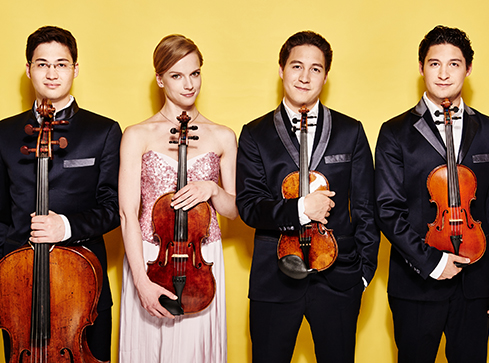
Chamber Music Explorations
ATHERTON, CA— Music@Menlo is one of the jewels of the Bay Area summer, which needs it; otherwise, the season is so often laggard in performing arts. This major chamber-music outlet brings in distant artists (19 of 49 from New York this year) for a wealth of concerts in an inviting setting.
This year’s format is stimulating: Seven concert programs in chronological sequence, each focusing on a significant decade of creativity. And each time a whole new team of three or four or more accomplished players takes the stage for each work, with the focus on major composers in lesser-heard pieces.
The so-called “Gay Nineties” (1890-1900) also produced very serious works in Europe. The musical highpoint of the night July 27 was Debussy’s trail-blazing, enigmatic String Quartet, a work breaking traditional rules of harmony. It replaced bar lines and beats with a nonstop musical flow like a mighty river. This understated, edgy piece pairs off dissimilar instruments while spinning off close harmony in short phrases. Played by the Schumann Quartet—pretty much a single-family German ensemble—this was the most polished performance of the night, with unified string textures and high interaction. The viola contribution by Liisa Randalu was exemplary.
The work was highly significant in helping open doors to the dawn of modernism. First came Debussy, then Stravinsky, then a veritable flood of innovators.
That cohesiveness and interaction is elusive for players brought together for a week or two to work together. An obscure early work by Josef Suk, the romantic Piano Quartet of 1891, showed influences of fellow-Czech Dvorak—first musical, then familial, as the relationship evolved into father-in-law and son-in-law. The foursome showed character and individuality, without great cohesion.
Festival Founder/Co-Director Wu Han took the rear (second) piano for the virtuosic, rambunctious Suite No. 1 for Two Pianos by a 20-year-old Rachmaninov. When the pianist-composer premiered it, even the gates of Kiev must have shaken with its emphatic trills, chords and runs, also with a few stunning “cathedral bells” in the bass register thrown in. Gilles Vonsattel blended skillfully with Wu Han, even though the score often seems on the verge of running off the rails at super speed.
To round out the night, the veteran pianist Gilbert Kalish, who I think must have been playing Music@Menlo before it was even a gleam in any one’s eye, gave a relaxed reading of Brahms’ Three Intermezzos Op. 117, as if to mark the end of German-dominated 19th-century romanticism. Color it mellow.
In its 17th season, under founding Co-Directors Wu Han and (cellist) David Finckel, “Music@Menlo” runs July 12-Aug. 3. Altogether, some 50 concerts and events are scheduled, including 37 younger performers (mostly strings) getting advanced instruction and coaching in chamber music, an indispensable ingredient of this intimate festival.
MUSIC AT MENLO chamber-music series, heard at the Menlo-Atherton (CA) Center for the Arts. For info: (650) 330-2030, or go online.